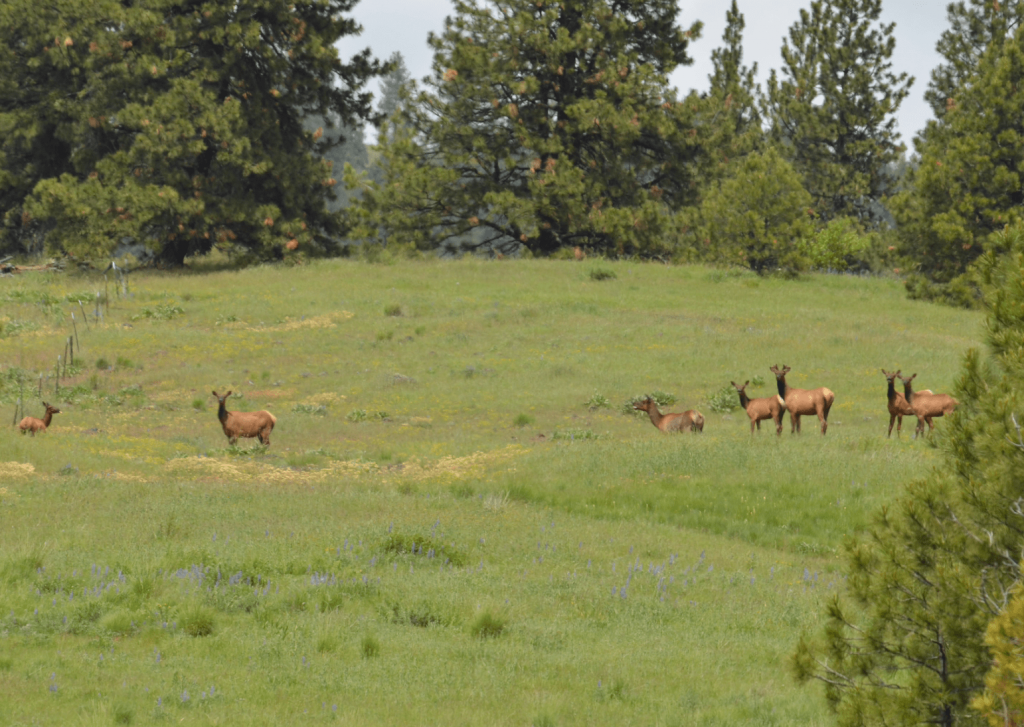
Washington 2021-23 Hunting Proposals Out For Comment
Point restrictions for whitetail bucks in seven Northeast Washington units, opening the 4-O Wildlife Area for general season deer and elk hunting, awarding hunters who kill hoof rot-stricken elk a chance to draw a special permit the following year, and tracking wounded game with dogs.

Those are some of the meatier of numerous 2021-23 hunting season proposals WDFW is looking for feedback.
Public comment opened today and runs through Sept. 15 and in addition to several virtual meetings planned starting next week, you can also for the first time text the agency your thoughts.

“This process is how we attempt to understand the type of hunting experience our hunters want, and we need your feedback to help us determine the path forward,” said Anis Aoude, WDFW game division manager, in a press release. “We’re looking at how we can bring in more participation even as we’re having to contend with current restrictions on public gatherings. We’re grateful to the hunters who already logged in this morning to provide feedback.”
Final decisions from the Fish and Wildlife Commission are expected early next spring.
Here’s more on the above elements:
In Northeast Washington, the agency is looking for feedback on whether to once again implement antler restrictions on whitetails, this time more broadly in Game Management Units 101, 105, 108, 111, 113, 117 and 121, Sherman, Kellyhill, Douglas, Aladdin, Selkirk, 49 Degrees North and Huckleberry.

The two most popular and productive of those units – Huckleberry and 49 Degrees North – fell under four-point restrictions after pushing from some hunters, but those regs fell by the wayside after three seasons and harvest rebounded.
Now the idea is back with input sought on two-, three- or four-point minimums for everyone but youth, senior and disabled sportsmen. Ahead of the public rollout WDFW teamed with WSU to survey hunters’ opinions.
“While not satisfied with mature white-tailed buck opportunity,
hunters are split on the value of its management with the majority,
especially those hunting in District 1, not supportive of further restricting regulations. Hunters were not supportive of any reduction in general season opportunity in the district but 2- and 3-pt APR, with exceptions, were the least opposed,” a white paper analysis from the agency’s Science Division reads.
Other deer-related proposals include:
- Reducing antlerless whitetail harvest on the Palouse to rebuild the herd after blue tongue outbreaks and harder winters (and removing general season antlerless mule deer harvest opportunities as hunters potentially switch species);
- Reducing antlerless whitetail harvest in the Mt. Spokane Unit for similar reasons;
- Eliminating antlerless mule deer harvest in the eastern Columbia Gorge to rebuild the herd which now meets the criteria for an “at risk” ungulate population, meaning harvest has dropped 25 percent below average for two years in a row;
- And offering Aug. 1-Dec. 31 second deer any-weapon permits to reduce blacktail populations on Blakely, Lopez, Orcas, San Juan, Shaw and Whidbey Islands.
As WDFW purchased the 10,464-acre 4-O Wildlife Area above the Grande Ronde in southwest Asotin County, deer and elk hunting was only available to those who drew a special permit, providing a “quality … experience” in a stunning landscape.
At the same time, the state parcel purchased from local rancher Mike Odom falls within Nez Perce Tribe ceded areas and as such is open for tribal hunting.
Now WDFW is looking to level the field.
“To ensure opportunities to access this area and hunt deer are similar for state and tribal elk hunters, the Department is proposing to eliminate Deer Area 1040, expand the hunt area for the special permits to GMU 172, and open the area during general deer seasons,” WDFW states.
The wildlife area is otherwise open for general season turkey, upland bird, cougar and bear hunting.



On the elk front, one WDFW proposal calls for a program to incentivize the killing of animals stricken with hoof rot, an incurable condition hitting the Mt. St. Helens, Willapa Hills and other herds.
WDFW says overall elk harvest would not increase but it would up the number of infected elk taken annually, most likely by those with antlerless permits. Those who submit a hoof or hooves at collection locations would be put in for a special drawing.
Option B would task Master Hunters with killing elk with hoof rot through a special permit.
Other elk proposals include:
- Removing the true spike restriction for Colockum herd general season archers;
- Switching the Stillaguamish Unit from any elk to three-point minimum;
- And adding some Chelan and Grant Counties GMUs to early and general archery and muzzleloader seasons, respectively, among others.
Proposals for other species include:
- Opening a spring permit hunt for male dusky and sooty grouse, a la Alaska’s hooter season, and move the start of forest grouse season back to mid-September or hold a Labor Day opener and then close hunting till early October;
- Lengthening the general fall turkey season to Sept. 1-Dec. 31 in Klickitat County units and opening a similar timed hunt in Northcentral Washington; boosting spring limits in Chelan County and GMU 124 to two and three; extending the spring youth hunt from one weekend to a full week; allow dogs for turkeys in fall; and OKing some handguns and rimfire rifles for hunting them;
- And allowing air rifles for grouse, rabbits and bullfrogs.
Finally, WDFW is mulling allowing hunters to use dogs to track wounded deer, elk, moose, mountain goats and bighorn sheep.
But it would come with some caveats, such as only during legal hunting hours (half hour before sunrise to half hour after sunset), limiting it to one dog at a time and which must be on its leash at all times, and only within the first three days after the wounding occurred.
To learn more about this and all the above, check out the proposals here and plan to attend the below virtual meetings:
- Tuesday, Aug. 25 – Small game, upland game, furbearers
- Thursday, Aug. 27 – General, equipment, and licensing
- Tuesday, Sept. 1 – Waterfowl
- Thursday, Sept. 3 – Elk
- Wednesday, Sept. 9 – Deer
- Thursday, Sept. 10 – Bighorn sheep, boundaries, and mountain goat
If you don’t have time for that, you can text your thoughts to WDFW.
To do so, send a message to 855-925-2801 using the keyword “deer,” “elk,” “small game,” “waterfowl,” “bighorn,” or “general.”
“Using the keyword ‘bighorn’ will give participants the opportunity to answer questions about bighorn sheep, boundaries, and mountain goats, and using the keyword ‘general’ will allow people to answer questions about equipment and licensing. If participants would like to provide feedback on all the above topics via text, they must complete one section at a time before texting in the next keyword,” WDFW explains.
